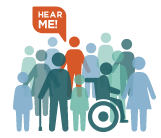
CLINICAL GUIDELINES: INTELLECTUAL DISABILITY AND PSYCHOTHERAPY
Study Lead: Andrea Witwer, PhD
Plain Language: https://www.rrtcnisonger.org/clear-language/
Summary
Individuals with IDD are at high-risk for mental health problems (USODPHP, 2018; Summers, Fletcher & Bradley, 2017 Hithersay et al., 2014; Hassiotis & Turk, 2012; Drum et al., 2009). In fact, mental health problems occur in up to 40% of adults with intellectual and developmental disabilities (IDD). (Cooper et al., 2007). Despite increased risk for mental health problems among the IDD population, there is a lack of training and comfort reported by mental health professionals in caring for people with IDD (Edwards et al 2007) which creates a large barrier for people with dual diagnosis in accessing mental health treatment. Mental health clinicians often view themselves as inadequately resourced and trained to meet the complex needs of this population (National & NSW Councils for Intellectual Disability, 2011), which leads to people with IDD being significantly less likely to receive psychotherapy services as compared to those without IDD (Dorn & Prout, 1993). One clinical resource that is central to providing quality mental health care is manualized treatments. Manualized treatments systematize interventions and improve treatment fidelity, which addresses clinicians’ reports of feeling inadequately resourced and trained to work with clients with IDD by giving clinicians specific treatment instructions and bolstering their confidence to work with this population.
The RRTC on health and function will address barriers in mental health treatment for adults with intellectual and developmental disabilities by developing best practice guidelines for psychotherapy to advance mental health treatment and interventions for adults (18 years of age and up) with IDD. The guidelines will be shaped from the results of a scoping literature review on psychotherapeutic interventions and techniques for adults with IDD and the results of local and national focus groups conducted with adults with dual diagnosis and mental health professional. Guidelines will also be shaped by feedback from our Disability Experiences Expert Panel (DEEP) and our Research Experience Expert Panel (REEP).
Methodology
Sample
For the focus group study, we will recruit a sample of 56 adults with IDD (18+ years of age) and co-occurring mental health concerns (referred to as dual diagnosis) and a sample of 56 mental health professionals who have experience treating individuals with IDD (N = 112 study participants).
Procedure
A total of 8 focus groups will be conducted locally with two groups of members a) focus groups with adults with dual diagnosis (Service Recipients) and b) focus groups with mental health professionals who have experience treating people with IDD (Service Providers).
For focus groups with Service Recipients (adults with dual diagnosis), participants will be asked to describe their experiences with the therapeutic process, including therapeutic relationships, barriers to treatment access, and accommodations for receiving and understanding treatment. For focus groups with Service Providers (mental health professionals), participants will be asked to describe their experiences with providing mental health treatment for adults with dual diagnosis, including strategies and barriers to the therapeutic process, as well as their experiences with developing a therapeutic relationship with individuals with dual diagnosis. All of the focus group questions will be framed by the results of our scoping literature review on psychotherapeutic interventions and techniques for adults with IDD.
Focus groups will be transcribed verbatim and analyzed by key personnel with statistical backgrounds. The main themes and subthemes of focus groups will be identified and coded. Local focus groups are to continue until content saturation is reached and no new themes emerge.
A total of 6 national focus groups will be conducted following local focus groups. These focus groups will be conducted at national IDD related conferences, such as National Association for the Dually Diagnosed (NADD), Self-Advocates Becoming Empowered (SABE), Association of University Centers on Disabilities (AUCD) and/or other related conferences. As with local focus groups, the sessions will be transcribed verbatim and analyzed by key personnel. If the themes at the national focus groups are the same as those at the local level, content saturation will be declared. If new themes emerge, focus groups will continue until saturation is reached.
The results of focus groups will be compiled and presented to our DEEP and REEP for comment. With the assistance of our expert panels we will interpret focus group data, synthesize with previous literature reviews, and construct best practice guidelines for providing quality psychotherapy to adults with dual diagnosis.
Expected Outcome
The expected outcomes of the clinical guidelines study includes the development of best practice criteria and guidelines that can be used by clinicians to help select and deliver high-quality mental and/or behavioral health treatment and interventions to adults with intellectual and developmental disabilities and co-occurring mental health concerns. This will be a state-of-the-art contribution of systematically created criteria and guidelines to address training/ knowledge needs of clinicians and their clients and which can be used as a basis for guiding further research and manualization of treatments.
See Study 1: Measure Adaptations – Intellectual Disability and Self-Report
See Study 2: Prevalence Study – Intellectual Disability and Mental Illness

